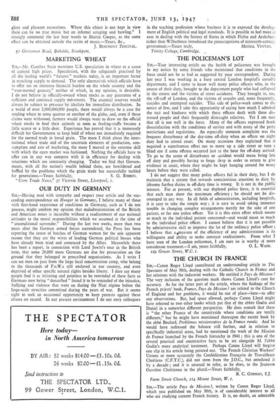OUR DUTY IN GERMANY
SIR,—Having read with sympathy and respect your article and the suc- ceeding correspondence on Hunger in Germany, I believe many of those with first-hand experience of conditions in Germany, such as I do not possess, might confirm my opinion that maladministration of the British and American zones is incurable without a readjustment of our national attitudes to the moral responsibilities which we assumed at the time of " unconditional surrender." During the last two weeks, more than two years after the German armed forces surrendered, the Press has been reporting the arrest of batches of German women for the sole apparent reason that they are the wives of leading German political bosses who have already been tried and sentenced by the Allies. Meanwhile there has been a report, in connection with Lord Jowitt's tour in the British zone, that some 20,000 more Germans are due for prosecution on the ground that they belonged to proscribed organisations. As I write I can see men on pass from the large local concentration camp, who belong, to the thousands of P.o.W.s still enslaved in our country, and even deprived of other specific natural rights besides liberty. I dare say many people find it as irritating and pointless to be reminded of these facts as Germans now being " denazified " found it to be reminded of the injustice, bullying and violence that went on during the Nazi regime before the large-scale atrocities committed during the years of. war. But it seems right to seek an occasional opportunity to keep protests against these abuses on record. In our present environment I do not envy colleagues in the teaching profession whose business it is to expound the develop- ment of English political and legal standards. It is possible to feel more at ease in dealing with the history of States in which Fichte and Arakcheev rather than Wilberforce introduced the preoccupations of ninteenth-century


































 Previous page
Previous page